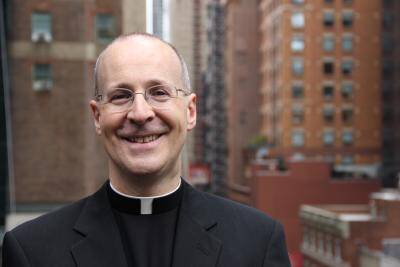One of the most unexpected blessings of being a Jesuit has been coming to know so many wonderful scholars—men and women deeply learned in a wide variety of fields. Before entering the Jesuits, the only contact I had with academics was listening to them lecture behind a podium.
Recently I wrote about my admiration for Daniel J. Harrington, S.J., the New Testament scholar who died in February (“Speaking the Word of God,” 3/10). But Dan is just one of many Jesuit scholars I’ve come to know. When I began studying at Weston Jesuit School of Theology, I met Richard Clifford, S.J., one of the world’s leading Old Testament scholars, at a Jesuit gathering. By way of conversation, I asked what he was teaching this semester. “Well,” he said, “Introduction to the Old Testament, Psalms and a tutorial on Akkadian.” Laughing, I told him how inadequate I felt. Not only had I never taught Akkadian, I had never studied it, nor had I any idea what it was!
Sometimes I forget how knowledgeable my brothers are. A few years ago I was in a church sacristy before Palm Sunday, preparing for the reading of the Passion. I wondered about the correct pronunciation of “Eli, eli, lema sabachthani,” one of Jesus’ utterances from the cross. Then it dawned on me: standing a few feet away was Anthony SooHoo, S.J., who is pursuing a Ph.D. in ancient languages. When I asked, Anthony gave me a classic Jesuit answer, “Well, actually there are two ways….”
Working at America has also introduced me to some of the world’s top Catholic scholars, Jesuit and otherwise: priests, religious and lay men and women. Some I’ve edited. Some I’ve corresponded with. Some I’ve met in person. Some have become friends.
Consequently, it’s always a treat when journalists call with what seems to them like a hopelessly abstruse Catholic question. “Father,” someone will ask, “I’m doing a story on the pallium. Do you know anyone who can talk to me about that?” Better than that, I will say, I know a Jesuit who did his doctoral dissertation on the pallium. (That’s Steven Schoenig, S.J., at Saint Louis University, for any pallium-ophiles.) While preparing to serve as a television commentator for Pope Francis’ installation Mass, it occurred to me that someone might ask about the pallium. I turned to Steve, who sent me a flawless two-paragraph précis. So I was able to dazzle the TV anchors with my newly found—and now sadly forgotten—knowledge about that item of liturgical vesture.
All this turned out to be immensely helpful when I was writing my new book on Jesus. Knowing a host of New Testament experts meant that I could not only consult their books and articles; I could send them an email or call them with questions. It was a huge blessing for a non-academic like me to be able to communicate with so many scholar-friends. In time, I sent copies of the manuscript to a dozen New Testament scholars for their corrections and comments.
What I received back was exegetical gold. Elizabeth Johnson, C.S.J., for example, reminded me of the significance of the question of whether Mary of Bethany anointed Jesus’ head or feet. John W. Martens (author of America’s Word column) pointed out how important filial loyalty would have been for Zebedee’s sons, lest we think leaving “everything” behind was easy for James and John. John R. Donahue, S.J., sent me an email full of insights about whether Jesus expected everyone to “get” his parables.
And Thomas D. Stegman, S.J., noted that when Jesus says he will “make” the disciples fishers of men, the Greek word used is poieo, from which we get the words poem and poetry, which conveys a sense of creating something new. In his note, Tom did something that I associate with the best scholars: he shared his wisdom in a way that doesn’t make one feel ignorant. His moving commentary about poieo was prefaced with the comment, “As you know, Jim, the word poieo....”
Well, I didn’t know. Just as I didn’t know what Akkadian was. Or where the pallium came from.
But I’m glad to know now. And I’m grateful to have been able to read, study with and now know so many talented scholars, who labored for many years in graduate school, cranked out dozens of papers and sweated over their Ph.D.’s—all serious and committed academics—who have helped so many of us understand the riches of our faith, both pallium and poieo.








